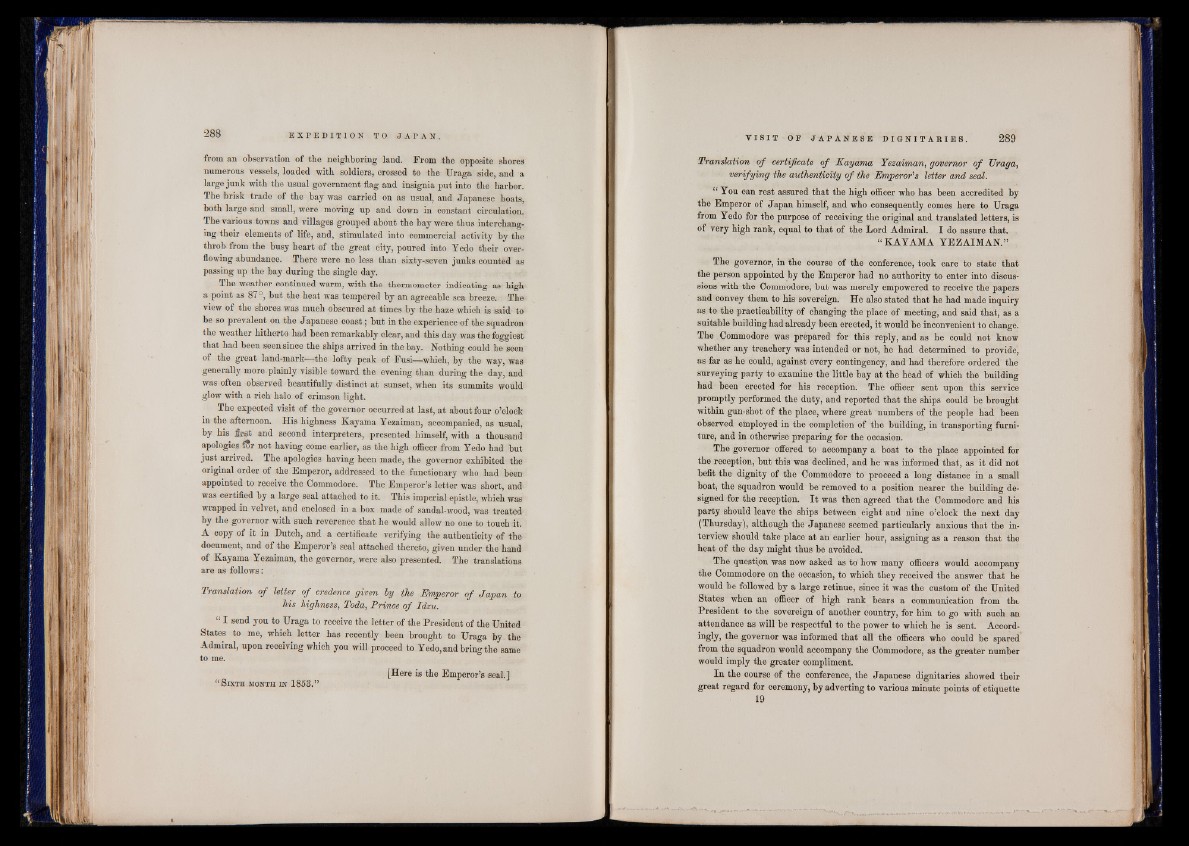
from an observation of the neighboring land. From the opposite shores
numerous vessels, loaded with soldiers, crossed to the Uraga side, and a
large junk with the usual government flag and insignia put into the harbor.
The brisk trade of the bay was carried on as usual, and Japanese boats,
both large and small, were moving up and down in constant circulation.
The various towns and villages grouped about the bay were thus interchanging
their elements of life, and, stimulated into commercial activity by the
throb from the busy heart of the great city, poured into Yedo their overflowing
abundance. There were no less than sixty-seven junks counted as
passing up the bay during the single day.
The weather continued warm, with the thermometer indicating as high
a point as 87°, but the heat was tempered by an agreeable sea breeze. The
view of the shores was much obscured at times by the haze which is said to
be so prevalent on the Japanese coast .; but in the experience of the squadron
the weather hitherto had been remarkably clear, and this day was the foggiest
that had been seen since the ships arrived in the bay. Nothing could be seen
of the great land-mark—the lofty peak of Fusi—whieh, by the way, was
generally more plainly visible toward the evening than during the day, and
was often observed beautifully distinct at sunset, when its summits would
glow with a rich halo of crimson light.
The expected visit of the governor occurred at last, at about four o’clock
in the afternoon. His highness Kayama Yezaiman, accompanied, as usual,
by his first and second interpreters, presented himself, with a thousand
apologies f8r not having come earlier, as the high officer from Yedo had but
just arrived. The apologies having been made, the governor exhibited the
original order of the Emperor, addressed to the functionary who had been
appointed to receive the Commodore. The Emperor’s letter was short, and
was certified by a large seal attached to it. This imperial epistle, which was
wrapped in velvet, and enclosed in a box made of sandal-wood, was treated
by the governor with such reverence that he would allow no one to touch it.
A copy of it in Dutch, and a certificate verifying the authenticity of the
document, and of the Emperor’s seal attached thereto, given under the hand
of Kayama Yezaiman, the governor, were also presented. The translations
are as follows:
Translation o f letter o f credence given by the Emperor o f Japan to
his highness, Toda, Prince o f Idzu.
“ I send you to Uraga to receive the letter of the President of the United
States to me, which letter has recently been brought to Uraga by the
Admiral, upon receiving which you will proceed to Yedo, and bring the same
to me.
[Here is the Emperor’s seal.]
“ Sixth month in 1853.”
Translation o f certificate o f Kayama Yezaiman, governor o f Uraga,
verifying the authenticity o f the Emperor's letter and seal.
“ You can rest assured that the high officer who has been accredited by
the Emperor of Japan himself, and who consequently comes here to Uraga
from Yedo for the purpose of receiving the original and translated letters, is
of very high rank, equal to that of the Lord Admiral. I do assure that.
“ KAYAMA YEZAIMAN.”
The governor, in the course of the conference, took care to state that
the person appointed by the Emperor had no authority to enter into discussions
with the Commodore, but was merely empowered to receive the papers
and convey them to his sovereign. He also stated that he had made inquiry
as. to the practicability of changing the place of meeting, and said that, as a
suitable building had already been erected, it would be inconvenient to change.
The Commodore was prepared for this reply, and as he could not know
whether any treachery was intended or not, he had determined to provide,
as far as he could, against every contingency, and had therefore ordered the
surveying party to examine the little bay at the head of which the building
had been erected for his reception. The officer sent upon this service
promptly performed the duty, and reported that the ships could be brought
within gun-shot of the place, where great numbers of the people had been
observed employed in the completion of the building, in transporting furniture,
and in otherwise preparing for the occasion.
The governor offered to accompany a boat to the place appointed for
the reception, but this was declined, and he was informed that, as it did not
befit the dignity of the Commodore to proceed a long distance in a small
boat, the squadron would be removed to a position nearer the building designed
for the reception. I t was then agreed that the Commodore and his
party should leave the ships between eight and nine o’clock the next day
(Thursday), although the Japanese seemed particularly anxious that the interview
should take place at an earlier hour, assigning as a reason that the
heat of the day might thus be avoided.
The questipn was now asked as to how many officers would accompany
the Commodore on the occasion, to which they received the answer that he
would be followed by a large retinue, since it was the custom of the United
States when an officer of high rank bears a communication from the
President to the sovereign of another country, for him to go with such an
attendance as will be respectful to the power to which he is sent. Accordingly,
the governor was informed that all the officers who could be spared
from the squadron would accompany the Commodore, as the greater number
would imply the greater compliment.
In the course of the conference, the Japanese dignitaries showed their
great regard for ceremony, by adverting to various minute points of etiquette
19